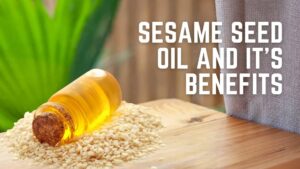
Sesame seed is one of the oldest oilseed crops known – almost 3000 years ago.
It is a plant in the genus Sesamun also called benne. It is grown in tropical regions around the world and is cultivated for the edible seeds, which grow in pods. Sudan, Myanmar and India are the largest producers in the world.
Nutritional Content of whole, dried sesame seeds:
100 grams of seeds contain carbohydrates, sugars, dietary fibre, saturated, monosaturated and polyunsaturated fat, protein, Vitamin A, B1, B2, B3, B6, folate and Vitamin E. The calcium content is 98 % of the daily value, Iron 112 %, magnesium 99%, phosphorus 90 %, potassium10%, sodium 1% and Zinc 82 percent of your daily values. Copper and manganese are also present. A typical serving is one tablespoon – 9 grams, so the percentage daily value is one – tenth of what is shown in the table.
Reduce Blood Pressure: Sesame oil is a stron anti hypersensitive thanks to its ability to help naturally lower blood pressure levels. It is effective at reducing both systolic and diastolic blood pressure. This is due to the lignans found in sesame. Magnesium found in sesame is a vasodilator and hence lowers blood pressure.
Lower your cholesterol: Sesame seeds contain lignans and phytosterols, which are plant compounds that can help lower cholesterol. Phytosterols are also believed to enhance your immune response and decrease your risk of certain cancers. Sesame seeds are found to have the highest total phytosterol content with 400 to 413 milligrams per 100 grams. These and other substances also prevent high blood pressure.
Boost fat burning : Sesame seeds have certain compounds which could help boost fat – burning and keep your waistline in check. Also being high in fibre , it helps slow the emptying of the stomach to keep you feeling fuller for longer.
Blood sugar:The dietary fibre content of sesame seeds, helps keep blood sugar levels steady to prevent spikes and crashes that lead to increased hunger and cravings.
Balance hormone levels:Sesame seeds increase and regulate levels of sex hormones, improve antioxidant status , and help manage cholesterol levels to optimise health.
Enhances nutrient absorption: The lignans found in black sesame seeds especially can enhance the anti – oxidant activity of Vitamin E.
The essential fats found in sesame seeds are needed for the absorption of fat soluble vitamins such as Vitamin A, D, E and K.
Oral Health: Sesame seeds can also get rid of the bacteria that can cause plaque on your teeth. An ancient practice called oil pulling with sesame oil, improves your oral hygiene and health when practiced regularly and correctly.
Bone health:Sesame seeds both hulled and unhulled, are rich in several nutrients that boost bone health , though the calcium is mainly in the hull. Sesame seeds are especially rich in nutrients, vital to bone health besides calcium.
Soaking, roasting or sprouting the seeds improve absorption of the minerals found in calcium.
Anti – inflammatory: Sesame seeds may fight inflammation. Sesame seeds and their oil may have these anti inflammatory properties due to their nutrient content.
Rich in B vitamins:Sesame seeds are a good source of thiamine, niacin and Vitamin B6, which are necessary for proper cellular function and metabolism.
Blood cells formation: Sesame seeds supply iron, copper and Vitamin B6, which are needed for blood cell formation and function.
Antioxidants: Plant compounds and Vitamin E in sesame seeds function as antioxidants, which combat oxidative stress in the body.
Mobility and arthritis: Sesamin, a compound in sesame seeds, may help reduce joint pain and support mobility in arthritis of the knee.
Thyroid health: Sesame seeds are good sources of nutrients – such as selenium, iron, copper, zinc and vitamin B6, that support thyroid health.
Skin and hair health: Sesame seeds/oil can treat bacterial and fungal infection. As a result, they can reduce dandruff, itchiness and flaking. They may also prevent or alleviate scalp infections. Sesame oil is a natural sun blocking agent that guards your hair against the sun’s harmful UV rays.
Sesame seeds keep the skin warm and moist. They are vital in healing redness and other facial skin issues by getting rid of pathogens and other agents causing skin infections. Sesame oil acts as a natural cleanser for the skin and removes soluble toxins from the skin pores gently.
Sesame has one of the highest oil contents of any seed and boasts a rich, nutty flavour, which is why sesame oil, tahini and the seeds itself are common ingredients in cuisines across the world.
Sesame seeds can perk up many dishes and are very easy to include in the diet. Stir fries, steamed broccoli, hot or cold cereal, granola bars, bread and muffins, crackers, yogurt, smoothies , salads, tahini, hummus and garnished can all incorporate sesame seeds.
Side effects of sesame seeds:
Sesame might cause allergic reactions in some people. Sesame oil can also cause nasal dripping and blockage, when used in some people with the allergy.
As many seeds do, whole sesame seeds contain a significant amount of phytic acid, which is an anti- nutrient as it binds to minerals, and prevents their absorption by carrying them along as they pass through the small intestine. Heating and cooking, roasting as well reduce the quantity of phytic acid in the seed.
All the best and happy healing from Naturally Dimpi!!

